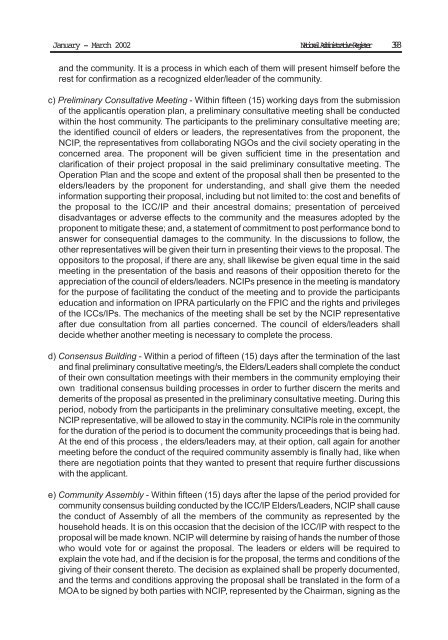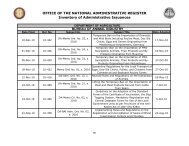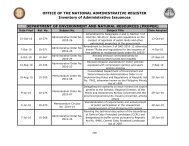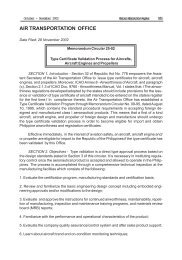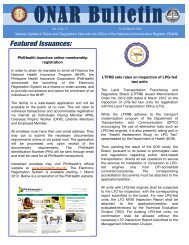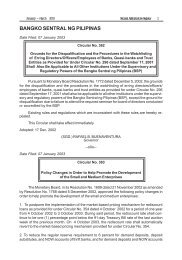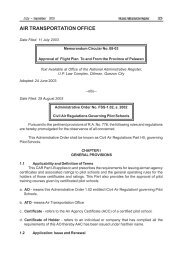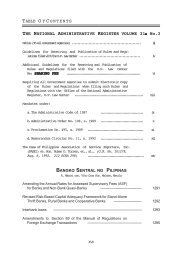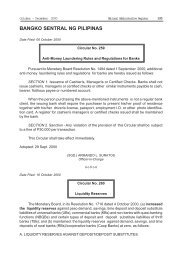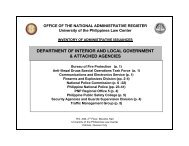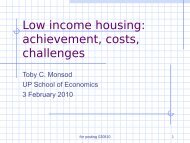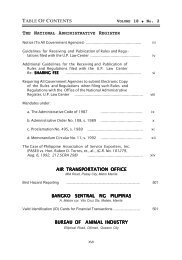Volume 13 Number 1 - University of the Philippines College of Law
Volume 13 Number 1 - University of the Philippines College of Law
Volume 13 Number 1 - University of the Philippines College of Law
You also want an ePaper? Increase the reach of your titles
YUMPU automatically turns print PDFs into web optimized ePapers that Google loves.
January - March 2002 National Administrative Register 393<br />
and <strong>the</strong> community. It is a process in which each <strong>of</strong> <strong>the</strong>m will present himself before <strong>the</strong><br />
rest for confirmation as a recognized elder/leader <strong>of</strong> <strong>the</strong> community.<br />
c) Preliminary Consultative Meeting - Within fifteen (15) working days from <strong>the</strong> submission<br />
<strong>of</strong> <strong>the</strong> applicantís operation plan, a preliminary consultative meeting shall be conducted<br />
within <strong>the</strong> host community. The participants to <strong>the</strong> preliminary consultative meeting are;<br />
<strong>the</strong> identified council <strong>of</strong> elders or leaders, <strong>the</strong> representatives from <strong>the</strong> proponent, <strong>the</strong><br />
NCIP, <strong>the</strong> representatives from collaborating NGOs and <strong>the</strong> civil society operating in <strong>the</strong><br />
concerned area. The proponent will be given sufficient time in <strong>the</strong> presentation and<br />
clarification <strong>of</strong> <strong>the</strong>ir project proposal in <strong>the</strong> said preliminary consultative meeting. The<br />
Operation Plan and <strong>the</strong> scope and extent <strong>of</strong> <strong>the</strong> proposal shall <strong>the</strong>n be presented to <strong>the</strong><br />
elders/leaders by <strong>the</strong> proponent for understanding, and shall give <strong>the</strong>m <strong>the</strong> needed<br />
information supporting <strong>the</strong>ir proposal, including but not limited to: <strong>the</strong> cost and benefits <strong>of</strong><br />
<strong>the</strong> proposal to <strong>the</strong> ICC/IP and <strong>the</strong>ir ancestral domains; presentation <strong>of</strong> perceived<br />
disadvantages or adverse effects to <strong>the</strong> community and <strong>the</strong> measures adopted by <strong>the</strong><br />
proponent to mitigate <strong>the</strong>se; and, a statement <strong>of</strong> commitment to post performance bond to<br />
answer for consequential damages to <strong>the</strong> community. In <strong>the</strong> discussions to follow, <strong>the</strong><br />
o<strong>the</strong>r representatives will be given <strong>the</strong>ir turn in presenting <strong>the</strong>ir views to <strong>the</strong> proposal. The<br />
oppositors to <strong>the</strong> proposal, if <strong>the</strong>re are any, shall likewise be given equal time in <strong>the</strong> said<br />
meeting in <strong>the</strong> presentation <strong>of</strong> <strong>the</strong> basis and reasons <strong>of</strong> <strong>the</strong>ir opposition <strong>the</strong>reto for <strong>the</strong><br />
appreciation <strong>of</strong> <strong>the</strong> council <strong>of</strong> elders/leaders. NCIPs presence in <strong>the</strong> meeting is mandatory<br />
for <strong>the</strong> purpose <strong>of</strong> facilitating <strong>the</strong> conduct <strong>of</strong> <strong>the</strong> meeting and to provide <strong>the</strong> participants<br />
education and information on IPRA particularly on <strong>the</strong> FPIC and <strong>the</strong> rights and privileges<br />
<strong>of</strong> <strong>the</strong> ICCs/IPs. The mechanics <strong>of</strong> <strong>the</strong> meeting shall be set by <strong>the</strong> NCIP representative<br />
after due consultation from all parties concerned. The council <strong>of</strong> elders/leaders shall<br />
decide whe<strong>the</strong>r ano<strong>the</strong>r meeting is necessary to complete <strong>the</strong> process.<br />
d) Consensus Building - Within a period <strong>of</strong> fifteen (15) days after <strong>the</strong> termination <strong>of</strong> <strong>the</strong> last<br />
and final preliminary consultative meeting/s, <strong>the</strong> Elders/Leaders shall complete <strong>the</strong> conduct<br />
<strong>of</strong> <strong>the</strong>ir own consultation meetings with <strong>the</strong>ir members in <strong>the</strong> community employing <strong>the</strong>ir<br />
own traditional consensus building processes in order to fur<strong>the</strong>r discern <strong>the</strong> merits and<br />
demerits <strong>of</strong> <strong>the</strong> proposal as presented in <strong>the</strong> preliminary consultative meeting. During this<br />
period, nobody from <strong>the</strong> participants in <strong>the</strong> preliminary consultative meeting, except, <strong>the</strong><br />
NCIP representative, will be allowed to stay in <strong>the</strong> community. NCIPís role in <strong>the</strong> community<br />
for <strong>the</strong> duration <strong>of</strong> <strong>the</strong> period is to document <strong>the</strong> community proceedings that is being had.<br />
At <strong>the</strong> end <strong>of</strong> this process , <strong>the</strong> elders/leaders may, at <strong>the</strong>ir option, call again for ano<strong>the</strong>r<br />
meeting before <strong>the</strong> conduct <strong>of</strong> <strong>the</strong> required community assembly is finally had, like when<br />
<strong>the</strong>re are negotiation points that <strong>the</strong>y wanted to present that require fur<strong>the</strong>r discussions<br />
with <strong>the</strong> applicant.<br />
e) Community Assembly - Within fifteen (15) days after <strong>the</strong> lapse <strong>of</strong> <strong>the</strong> period provided for<br />
community consensus building conducted by <strong>the</strong> ICC/IP Elders/Leaders, NCIP shall cause<br />
<strong>the</strong> conduct <strong>of</strong> Assembly <strong>of</strong> all <strong>the</strong> members <strong>of</strong> <strong>the</strong> community as represented by <strong>the</strong><br />
household heads. It is on this occasion that <strong>the</strong> decision <strong>of</strong> <strong>the</strong> ICC/IP with respect to <strong>the</strong><br />
proposal will be made known. NCIP will determine by raising <strong>of</strong> hands <strong>the</strong> number <strong>of</strong> those<br />
who would vote for or against <strong>the</strong> proposal. The leaders or elders will be required to<br />
explain <strong>the</strong> vote had, and if <strong>the</strong> decision is for <strong>the</strong> proposal, <strong>the</strong> terms and conditions <strong>of</strong> <strong>the</strong><br />
giving <strong>of</strong> <strong>the</strong>ir consent <strong>the</strong>reto. The decision as explained shall be properly documented,<br />
and <strong>the</strong> terms and conditions approving <strong>the</strong> proposal shall be translated in <strong>the</strong> form <strong>of</strong> a<br />
MOA to be signed by both parties with NCIP, represented by <strong>the</strong> Chairman, signing as <strong>the</strong>


